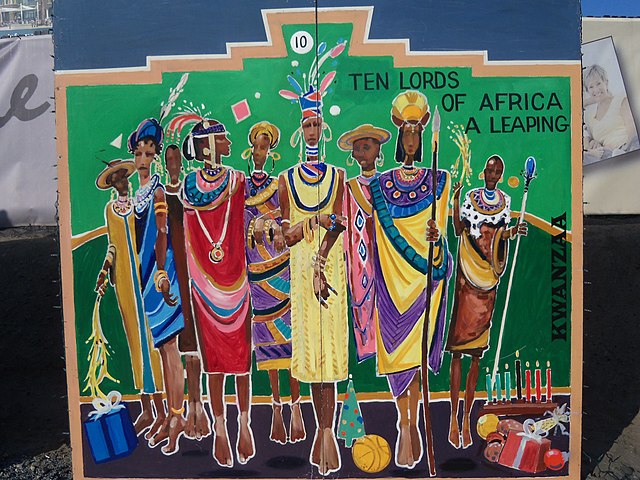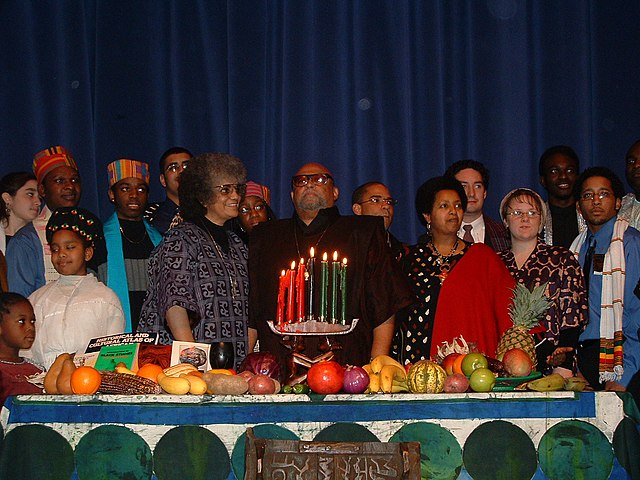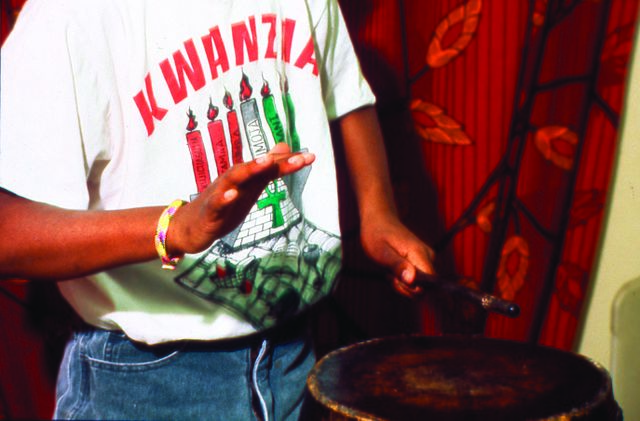
Through the generosity of the late Professor Benedict Anderson and Ajarn Charnvit Kasetsiri, the Thammasat University Library has acquired some important books of interest for students of Association of Southeast Asian Nations (ASEAN) studies, political science, literature, and related fields.
They are part of a special bequest of over 2800 books from the personal scholarly library of Professor Benedict Anderson at Cornell University, in addition to the previous donation of books from the library of Professor Anderson at his home in Bangkok. These items are shelved in the Charnvit Kasetsiri Room of the Pridi Banomyong Library, Tha Prachan campus.
Among them is a book useful for TU students interested in history, political science, sociology, comparative religion, African American studies, and related subjects.
Fighting for US: Maulana Karenga, the US organization, and black cultural nationalism discusses the holiday of Kwanzaa in the United States, which will begin on Saturday, December 26 and end on Friday, January 1, 2021.
Kwanzaa is an annual celebration of African-American culture that includes a communal feast. It was first celebrated in 1966, based on African harvest festival traditions from different parts of Africa.
The holiday was created after one of the series of uprisings about the treatment of African Americans by U.S. officials. These included the Harlem riot of 1964, the 1964 Rochester race riot, the Dixmoor race riot, the 1964 Philadelphia race riot, the Watts riots, the Chicago West Side riots, Hough riots, Waukegan riot of 1966, Hunters Point social uprising, Long, hot summer of 1967, riots following the assassination of the Rev. Dr. Martin Luther King in 1968, and the 1969 York race riot.
The TU Library collection includes a number of books about the struggles of African Americans and different aspects of the history of the US Civil Rights movement.
Kwanzaa was invented in 1966 after the Watts riots to provide something to African-Americans inspired by their cultural heritage and history, rather than to celebrate European holidays.
The name Kwanzaa was reportedly derived from a phrase in the Swahili language meaning first fruits. Swahili is spoken by an estimated 90 million people in Africa alone, and is the most widely-spoken African language. It is the national language of Kenya, Tanzania, Uganda, and the Democratic Republic of the Congo (DRC), and is used as the “lingua franca” throughout East and Southeast Africa.
The TU Library also owns books about Swahili language and culture for students interested in linguistics and other subjects.
There are a number of first fruits festivals in Southern Africa, which celebrate the harvest.
Some African Americans who celebrate Kwanzaa also celebrate Christmas.

Principles and symbols of Kwanzaa
Kwanzaa celebrates the seven principles of African heritage, including:
- Unity: To strive for and to maintain unity in the family, community, nation, and race.
- Self-determination: To define and name ourselves, as well as to create and speak for ourselves.
- Collective work and responsibility: To build and maintain our community together and make our brothers’ and sisters’ problems our problems and to solve them together.
- Cooperative economics: To build and maintain our own stores, shops, and other businesses and to profit from them together.
- Purpose: To make our collective vocation the building and developing of our community in order to restore our people to their traditional greatness.
- Creativity: To do always as much as we can, in the way we can, in order to leave our community more beautiful and beneficial than we inherited it.
- Faith: To believe with all our hearts in our people, our parents, our teachers, our leaders, and the righteousness and victory of our struggle.
Kwanzaa symbols include a mat on which other symbols are placed, such as a candle holder for seven candlesticks, seven candles, crops, corn, a unity cup for commemorating and giving thanks to African ancestors, and gifts. Other representations include a poster, a black, red, and green flag, and African books and artworks which are intended to represent values and concepts of African culture and contribute to community building and reinforcement. Ears of corn represent children celebrating and corn may be part of the holiday meal.
Observances
Families celebrating Kwanzaa decorate their households with objects of art, colorful African cloth, and fresh fruits that represent African idealism. It is customary to include children in Kwanzaa ceremonies and to give respect and gratitude to ancestors.
A Kwanzaa ceremony may include drumming and musical selections, a candle-lighting ritual, artistic performance, and other observations.
As of 2009, between 500 thousand and two million Americans celebrated Kwanzaa, or between one and five percent of African Americans.
In 2015, the National Retail Federation published the results of a marketing survey on winter holidays, revealing that about six million people in the United States planned to celebrate Kwanzaa.
Kwanzaa in society
The sociologist Stjepan Meštrović has written about Kwanzaa, describing the holiday as an example of postmodernism.
The TU Library owns publications by Professor Meštrović.
Professor Meštrović suggests that some people may find historical traditions such as Christmas to be oppressive, but relatively new holidays designed for modern people such as Kwanzaa may help them deal with the pressures of modern society.
The celebrated African American poet Dr. Maya Angelou has narrated a documentary film about Kwanzaa, The Black Candle.
The TU Library owns a number of books with texts written by Dr. Maya Angelou.
A Kwanzaa stamp was issued by the United States Post Office in 1997.
Another African American celebrity who celebrates Kwanzaa each year is the talk show host Oprah Winfrey.
The TU Library collection includes a number of books by and about Oprah Winfrey.
According to the African Studies Program of the University of Wisconsin-Madison in 1990, Kwanzaa is not a festival originating in any of the 55 African countries nor is it an African Christmas celebration. Kwanzaa is an African American celebration of life from 26 December to 1 January… In fact one might say that Kwanzaa has similarities with Thanksgiving in the United States or the Yam Festival in Ghana and Nigeria.
The founder of the holiday, Maulana Karenga, stated in his Annual Kwanzaa Message for 2009 on Principles and Practices of Kwanzaa: Repairing and Renewing the World:
Kwanzaa was conceived, created and introduced to the African community as an audacious act of self-determination.

(All images courtesy of Wikimedia Commons)
